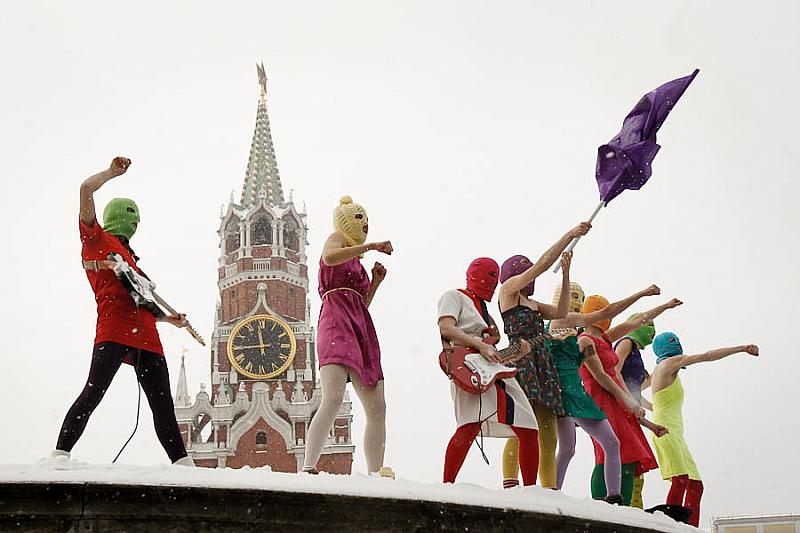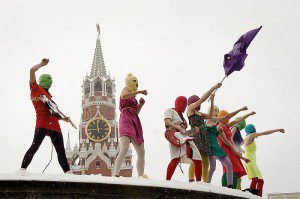23 Feb 2012 | Russia
Pussy Riot is a feminist punk collective from Moscow. They hide their faces under coloured balaclavas, use nicknames to remain anonymous and perform unsanctioned concerts in peculiar places. Since their emergence last autumn Pussy Riot have performed in underground stations, in shops and on trolleybuses and detention centres’ roofs.
Pussy Riot came to the attention of Russia’s anti-extremist police. In late January they performed an anti-Putin song in the Red Square right in front of Kremlin. The performers were arrested and had to spend several hours in a police cell.
But this week’s “concert” brought them real public attention after they performed what they called a punk prayer “Mother of God, send Putin away” in Moscow’s biggest Orthodox Cathedral. It is the Cathedral high-ranking officials usually attend on the biggest Orthodox holidays. The leader of the Orthodox Church, Patriarch Kirill, is a Putin supporter.
The band got into the cathedral just like regular parishioners, but then started dancing and shouting out anti-Putin words:
KGB head is the biggest saint, who leads protesters to pre-trial prisons … The Patriarch believes in Putin. He should rather believe in God … Mother of God, become a feminist… Send Putin away
The group managed to evade the cathedral’s security, and no one was arrested. Even if one of them did get arrested, she would be quickly replaced, the women explained to journalists. Pussy Riot has no leaders or permanent participants — they are just an anonymous group of punk feminists fighting authoritarianism.
13 Jun 2013 | Digital Freedom, Europe and Central Asia

Pussy Riot – videos of their “Punk Prayer” protest are blocked by Russian authorities
April saw a bizarre variety of sites blocked by the Russian authorities or internet service providers – among them Pussy Riot videos, Wikipedia, the Yandex search engine, Blogger blogs, sites promoting bribery and corruption, sites of land developers and the humorous anti-encyclopaedia Absurdopedia (the Russian version of Uncyclopedia). Even the parody website Gospoisk (gossearch.ru) was blocked. The site is a fake search engine, ostensibly created with government support: when a visitor types a query in the search box, he or she is asked to enter his first and last name, patronymic, passport details, address and the reason for the request. Compiled by Andrei Soldatov
(more…)
15 Mar 2012 | News and features
 In a “repressive” decision, Moscow city court refuse to release two members of punk feminist group Pussy Riot. Elena Vlasenko reports
In a “repressive” decision, Moscow city court refuse to release two members of punk feminist group Pussy Riot. Elena Vlasenko reports
(more…)
2 Aug 2024 | Europe and Central Asia, Germany, News and features, Newsletters, Russia
There is a tendency to see Russia as a huge monolithic entity with a matching ideology. This is the expansionist, imperial Russia that poisons its enemies and kidnaps their children. It is the Russia of the gulags, of Putin, Stalin and the Tsars. But there is another Russia. It is the Russia of the eight brave students who stood in Red Square in 1968 to demonstrate against the invasion of Czechoslovakia and inspired the founders of this magazine. It the Russia of the dissidents of the 1970s and the reformers of the 1990s. It is the Russia of Pussy Riot, of Alexander Livintenko, Boris Nemtsov and Alexei Navalny.
This is the Russia of Vladmir Kara-Murza, the Russian activist, politician, journalist and historian released this week in a prisoner swap with Russian spies held in the West.
Much has been made of the detention and release of American journalist Evan Gershkovich – and rightly so. The Wall Street Journal reporter has become an important symbol of the fundamental values of a free media. It is to his eternal credit that his final request before release was an interview with Vladimir Putin. We also welcome the release of Alsu Kurmasheva, a Radio Free Europe/Radio Liberty journalist from the Tatar/Bashkir service.
But it is Vladimir Kara-Murza who most fully represents the dissident spirit of Russia that runs counter to the authoritarian tendency that has dominated the country for so much of its recent history.
He is often described simply as one of the fiercest opponents of Putin, But Kara-Murza is so much more than that. He is above all the keeper of the flame of the Russian dissident tradition. He, more than anyone, understands the power of this alternative version of Russian identity.
Supporters of Index interested in the subject should watch the four-part documentary series, They Chose Freedom, directed and presented by Kara-Murza in 2005. The film is edited by his wife Evgenia, who has led the campaign for his release. Two decades later it is still acts as a powerful reminder of the courage of those who spoke out against the Soviet system. It examines the roots of the dissident movement in the weekly poetry readings held in Mayakovsky Square in the 1950s. It includes interviews with the key players in the movement, including Vladminir Bukovsky, Anatoly Sharnsky and three of the participants of the Red Square demonstration of 1968, Pavel Litvinov, Natalya Gorbanevskaya and and Viktor Fainberg.
In April 2023, shortly before he was sentenced to 25 years for charges linked to his opposition to the war in Ukraine, Kara-Murza said: “I know the that the day will come when the darkness engulfing our country will clear. Our society will open its eyes and shudder when it realises what crimes were committed in its name.”.
The release comes after reports earlier this year that Kara-Murza had been transferred to a harsher prison regime and that his health was deteriorating. An image shared on Telegram (see above) by fellow dissident Ilya Yashin, also released in the prisoner swap, show Kara-Murza this morning in Germany where they will hold a press conference later today. We await news that he and family will finally be able to welcome him back to Britain, which they have made their home.


